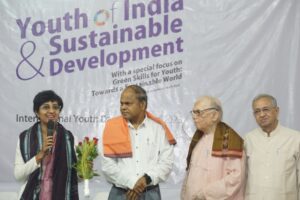Youth of India & Sustainable Development
CYSD’s Public Lecture Series on ‘Youth Work’
Addressing the audience, Dr.(Prof) Pitabasa Sahoo stated, “Today, 12th August, we are celebrating the International Youth Day globally and I am happy to acknowledge CYSD’s pioneering role in empowering the youth and uplifting the underprivileged communities of Odisha”.
 He continued, “India’s ‘demographic dividend’ emerges from its diverse and youthful population, aged approximately 10 to 24, shaping the nation’s future. Addressing challenges in education, employment, and gender equality is vital, with youth engagement being pivotal. Government initiatives like NCC, NSS, and NYKS underscore their significance in nation-building. Through collaboration and action, India’s youth can drive positive change for a promising tomorrow. The government’s commitment to youth development is evident through policies, programs, and collaborative efforts, acknowledging the vital role of the youth in shaping India’s future”.
He continued, “India’s ‘demographic dividend’ emerges from its diverse and youthful population, aged approximately 10 to 24, shaping the nation’s future. Addressing challenges in education, employment, and gender equality is vital, with youth engagement being pivotal. Government initiatives like NCC, NSS, and NYKS underscore their significance in nation-building. Through collaboration and action, India’s youth can drive positive change for a promising tomorrow. The government’s commitment to youth development is evident through policies, programs, and collaborative efforts, acknowledging the vital role of the youth in shaping India’s future”.
He tells us about SDGs, “The United Nations Sustainable Development Goals (SDGs) are 17 interconnected targets aimed at addressing global challenges and creating a sustainable and equitable future for all by 2030. The SDGs build upon the Millennium Development Goals (MDGs) but with a holistic approach and recognition of interconnected challenges. The 17 SDGs include goals like ending poverty, achieving food security, ensuring good health, promoting education, gender equality, clean water, sustainable energy, economic growth, industry and innovation, reducing inequality, sustainable cities, responsible consumption, climate action, ocean and land conservation, peace, justice, and partnerships for sustainable development.”
The ‘youth bulge’ highlights a demographic trend with a large young population, emphasizing the need for youth employment and peace-building. India’s youthful average age of 29 presents a “demographic dividend,” propelling a $5 trillion economy goal. However, challenges like education, employment, and gender inequality must be tackled. Youth contribute as human capital, driving innovation, entrepreneurship, and economic growth. Youth activism drives change for gender equality and environmental conservation. Their critical thinking, innovation, and tech skills enable effective advocacy via digital platforms. The Indian government has launched various schemes and programs for youth empowerment and development:
- Rashtriya Yuva Sashaktikaran Karyakram (RYSK): Through initiatives like Nehru Yuva Kendra Sangathan (NYKS), National Youth Corps (NYC), and National Young Leaders Programme (NYLP), this program aims to foster youth leadership, engagement in nation-building, and personality development.
- National Service Scheme (NSS): Providing opportunities for community service and social development, NSS encourages youth participation in various community projects.
- Rajiv Gandhi National Institute of Youth Development (RGNIYD): Dedicated to youth research and development, RGNIYD focuses on enhancing youth skills and knowledge.
- Green Skill Development Programme: Addressing skill gaps in environmental fields, this program, by the Ministry of Environment, Forests & Climate Change, offers training in areas like wildlife conservation and horticulture. It empowers youth to drive sustainable practices and promote a greener future.
In the transition towards a green economy, green jobs and skills are pivotal. They drive innovation, inclusivity, and sustainable growth while addressing global challenges like climate change. Youth involvement is essential in advocating for a greener world, fostering awareness, innovation, and community engagement. Collaboration between governments, businesses, and individuals is key to creating a resilient and sustainable future.
